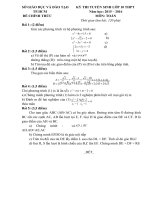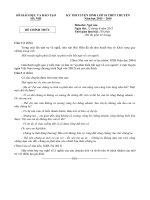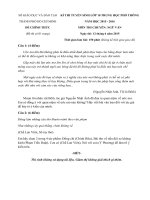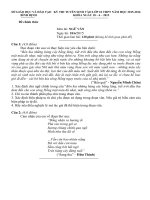Tải Đề ôn thi vào lớp 10 môn Tiếng Anh năm học 2019 - 2020 sở GD - ĐT Thái Nguyên - Đề thi thử vào lớp 10 môn Tiếng Anh có đáp án
Bạn đang xem bản rút gọn của tài liệu. Xem và tải ngay bản đầy đủ của tài liệu tại đây (114.62 KB, 6 trang )
<span class='text_page_counter'>(1)</span><div class='page_container' data-page=1>
<b>ĐỀ THI VÀO LỚP 10 MÔN TIẾNG ANH</b>
<b>NĂM HỌC 2019 - 2020</b>
<b>I. Choose the word which has the underlined part pronounced differently from the </b>
<b>rest.</b>
01. A. walks B. cups C. students D. pens
02. A. town B. grown C. cow D. down
03. A. heal B. hockey C. exhaust D. hole
04. A. washed B. wanted C. booked D. hoped
05. A. school B. children C. Chinese D. church
1. 2. 3. 4. 5.
<b>II. Give the correct form of the verbs in brackets.</b>
06. I usually (play)______soccer after school.
07. We (go) ______to the cinema with our friends last night.
08. When I phoned Julia last night she (watch) ______TV.
09. This is the first time I (meet) ______my penpal, Linda.
10. Look! He (ride) ______his bike so fast.
6. 7. 8. 9. 10.
<b>III. Choose the best answer for each of the following sentences.</b>
11. Mai: May I use your phone, Ha ?
Ha : Certainly.______.
A. Hold on please B. It doesn’t matter
C. Here you are D. You’re well come
12. Everyone can learn how to swim, ______?
A. can she B. can't they C. they can D. can’t he
13. A: Would you like to have lunch with us? - B: ______
A. Yes, I would B. Why not C. I’d love to D. It’s doesn’t
14. Do you know that man,______ is sitting next to your sister?
</div>
<span class='text_page_counter'>(2)</span><div class='page_container' data-page=2>
15. I don't like doing the ______,especially cleaning the windows.
A. homework B. housework C. job D. occupation.
16. Nguyen Du is considered a famous Vietnamese ______.
A. poem B. poetry C. poetic D. poet
17. He studied very hard,______ he passed the exam easy.
A. so B. but C. because D. however
18. The girl ______dinner in the kitchen is my sister.
A. cook B. cooked C. cooking D. cooks
19. The car ______ in Japan is more expensive than the one in Vietnam.
A. made B. making C. makes D. make
20. He wishes he ______become a famous singer in the future.
A. will B. would C. can D. ma
11. 12. 13. 14. 15.
16. 17. 18. 19. 20.
<i><b> IV. There is a mistake in the four underlined parts of each sentence. Find and </b></i>
<b>correct the mistakes.</b>
21. He wants to join the club when he enough old.
A B C D
22. My mother asked me did I liked my new room.
A B C D
23. We went at Ho Chi Minh city last Sunday.
A B C D
24. He often works hardly before he has an exam.
A B C D
25. A lot of the equipment in her house are new.
A B C D
21. 22.
23. 24.
25.
</div>
<span class='text_page_counter'>(3)</span><div class='page_container' data-page=3>
27. Mai’s sister is a______ (SING)
28. My brother often listens to music after ______ (WORK)
29. We are impressed by the ______of the people in your town.(FRIENDLY)
30. Last night I read a very______ short story. (EXCITE)
26. 27.
28. 29.
30.
<b>VI. Read the following passage, then choose the correct answer. </b>
Every year many people in the world learn English. Some of them are young children.
(31) ______ are teenagers.Many are adults. Some learn at school, and some learn in
evening classes.A few learn English by (32) ______or just by (33) ______to the
language on television or among their friends. Most people must work hard to learn
English. (34) ______do all these people want to learn English? It is difficult to anwer that
question.
Young children learn English at school to study better at their subject. Many adults
learn English because (35)______useful for their work. Teenagers often learn English for
their (36) ______ studies, because some of their books are written (37) ______English at
their college or university. Other people learn English because they want to read English
newspapers or magazines for (38) ______and entertainment.
31. A. The others B. Others C. Anothers D.Each others
32. A. them B. their C. themselves D. theirs
33. A.listening B. speaking C. talking D. hearing
34. A. What B. How C. Why D. Where
35 A. they are B. it is C. there is D. of being
36 A.taller B. higher C. better D. fuller
37. A. in B. at C. by D. with
38. A. equipment B. example C. transportation D. information
31. 32. 33. 34. 35.
36. 37. 38.
</div>
<span class='text_page_counter'>(4)</span><div class='page_container' data-page=4>
Alexander Graham Bell was born in 1847 in Edinburgh, Scotland. His father was an
expert in phonetics, the study of the sounds of languages. As a boy, Bell became
interested in sounds and speech.
In 1870 the Bells decided to emigrate to America. They lived in Boston, where
Alexander taught in a school for the deaf – mutes. There, he began experimenting with a
machine to help the deaf hear.Soon, Bell started experimenting with ways of transmitting
speech over a long distance.
While experimenting with this machine, Bell had an idea. Why not use electricity to
send the human voice from one place to another? Bell began work on a new invention of
the telephone.Bell and his assistant, Thomas Watson, conducted many experiments and
finally came up with a divide which they first introduced in 1876. Bell said on the
telephone: "Mr.Watson, come here. I want you." This was the first telephone message.
39. When was Alexander G. Bell born?
A. In 1847. B. In 1870. C. In 1870s. D. no information.
40. He went to live ………..
A. in Scotland B. in Australia C. in Boston D. B & C are correct.
41. What does the word “emigrate” in line 3 mean?
A. goes to a place for a short time.
B. leaves somebody’s country to live in another country.
C. travels a long way from home to work every day.
D. gets away from something dangerous.
42. Which of the following is NOT TRUE?
A. Bell’s father was an expert in phonetics.
B. Bell became interested in sounds and speech since he was a boy.
C. Bell learned in a school for the deaf – mutes.
D. He experimented a machine to help the deaf hear.
43. Bell was the inventor of the ………..
A. telephone B. television C. bicycle D. gas cooker
44. When was the first telephone introduced ?
A. 1870 B. 1876 C. 1786 D. 1780
45.He called his ______ on the first telephone message.
</div>
<span class='text_page_counter'>(5)</span><div class='page_container' data-page=5>
39. 40. 41. 42. 43.
44. 45.
<b>VIII. Finish each of the following sentences in such a way that it means exactly the </b>
<b>same as the sentence printed before it.</b>
41. It is not safe to going out alone at night.
Going………
42. I don’t have anough money but I like the blue shirt in this shop very much.
If……….………...
43. He is not only good at English but he also draws very well
Not only ………
44. They built a new museum in the city center two months ago.
A new………
45. “Can you give me a lift to school?” he asked Mary.
He asked Mary………
<i><b>Total mark: 50 correct answers = 10 marks</b></i>
<b>ĐÁP ÁN VÀ BIỂU ĐIỂM</b>
<i><b>I. Choose the word which has the underlined part pronounced differently from the </b></i>
<i><b>rest.</b></i>
1.D 2.B 3.C 4.D 5.A
<i><b>II. Give the correct form of the verbs in bracket.</b></i>
6. play 7. went 8. was
watching
9. have met 10. is riding
<b>III. Choose the best answer for each of the following sentences.</b>
11. C 12. B 13. C 14. B 15. B
16. D 17. A 18. C 19. A 20. B
<i><b>IV- There is a mistake in the four underlined parts of each sentence. Find and correct </b></i>
<i><b>the mistakes</b></i>
21. D 22. B
23. B 24. B
</div>
<span class='text_page_counter'>(6)</span><div class='page_container' data-page=6>
<b>V. Give the correct form of the words in brackets to complete these sentences.</b>
26. proud 27. singer
28. working 29. friendliness
30. exciting
<b>VI. Read the following passage, then choose the correct answer. </b>
31.B 32.C 33.A 34.C 35.B
36.B 37.A 38.B
<b>VII.Read the passage, then choose the correct answer.</b>
39. A 32. D 33. B 34.C 35.A
36. B 37. A 38. C
</div>
<!--links-->
Tài liệu ĐỀ THI TUYỂN SINH VÀO LỚP 10 THPT NĂM HỌC 2009 – 2010 - SỞ GD&ĐT NGHỆ AN ppt
- 2
- 518
- 0








